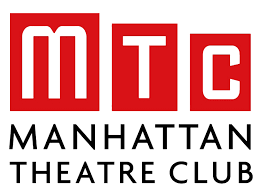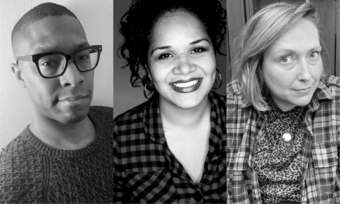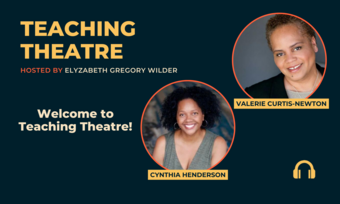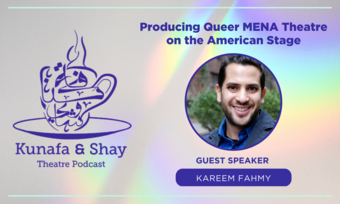Risky Business
A Conversation Between Lynne Meadow and Gladys Chen
This piece marks the first in a partnership between HowlRound and the League of Professional Theatre Women (LPTW). For many years, LPTW has been publishing an annual magazine, Women in Theatre (WIT). This year they've expanded the magazine to include an online format and are collaborating with HowlRound to provide content covering an array of issues and perspectives within the theatre, all highlighting women's voices. The co-editors for this project are Eliza Bent and Alexis Clements. Look for bi-monthly content from WIT on HowlRound ranging from interviews to articles and blog responses.

Photo by Second Generation Productions.
Running a not-for-profit theatre company takes guts and comes with great risk, whether you are a small Off-Off Broadway company or have made it all the way to Broadway. It is a labor of love and it is not for the squeamish. To make theatre a part of your life, you have to be resilient, wear many hats, and try not to lose your passion and drive along the way. In her forty years as the visionary and artistic leader of Manhattan Theatre Club (MTC), Lynne Meadow has been an inspiration to many theatremakers, creating adventurous work that has put the company at the forefront of the American stage. Gladys Chen, has been the President of Second Generation Productions (2g) for sixteen years. 2g is a not-for-profit Off-Off Broadway theatre company with a mission to nurture the new work of Asian American artists. Gladys also holds a MBA from the Wharton School of Business and has held numerous positions in advertising and marketing at several Fortune 500 companies. These two women, both at very different stages of their careers, discuss their theatres, who and what has shaped them as artists and leaders, and how they manage their lives outside of the theatre.

Photo by Manhattan Theater Club.
Gladys Chen: One of the challenges that I face with a small non-profit theatre company is how to expand. How do you manage growing MTC both artistically and financially? Do you ever experience growing pains?
Lynne Meadow: I think that we’ve experienced growing pains from day one. First and foremost, just trying to survive. That’s always the tough one—trying to survive every season. Every season we think, “Are we going to make the numbers that we need?” When I first started, we had a tiny budget, our annual budget was $75K. Now, it’s a lot more, but it’s always the same pressure.
Gladys: With that pressure in mind, how do you manage risk when it comes to choosing work to produce?
Lynne: It’s a constant source of discussion. I used to say, “Our highest risks were always our greatest successes.” Every show that we did, that we really took a risk on, and had no idea how it was going to turn out, was a show in our history that had great acclaim. One of the first plays I ever directed was a play called Ashes, by David Rudkin. I remember going to talk to Barry Grove, MTC’s Executive Producer, and I said to him, “I’m going to do a play about a couple who are trying to have a baby. It is a very raw play—very graphic, lots of blood on the stage. I’m a little nervous about it, but I want you to know that I feel strongly about it.“ He said, “Well, if you feel strongly about it, we have to do it.” And that’s what we’ve tried to do for over thirty-five years—if you feel strongly about it, you do it. Ashes turned out to be a highlight in MTC’s history. It was a very important play at its time. Joe Papp went on to produce it at the New York Shakespeare Festival. In a way, it has been a prototype and a beacon. I think everyone working in the theatre is doing it for some reason that involves passion and risk.
Gladys: I agree. Like you, I also started producing theatre when I was twenty-four and I had just quit graduate school. When you tell your Chinese parents that you are quitting medical school to start a theatre company with a friend, they look at you like you’ve gone mad and decided to join the circus. I remember our first show at Second Generation was a musical called Making Tracks, which was about a young Asian American rock musician that journeyed through six generations of his family’s history to understand their long labor to find a voice in America. I financed the show with my personal credit card and just prayed that we could make it.
When you tell your Chinese parents that you are quitting medical school to start a theatre company with a friend, they look at you like you’ve gone mad and decided to join the circus.
Lynne: That must have been very difficult!
Gladys: Yes. I had just quit medical school, moved back home with my parents, and gotten my first job in advertising. Not exactly a time to finance a theatre production on your personal credit card. But, as you said, it was one of the most rewarding experiences. Maybe you take more risk because you don’t know what you don’t know.
Lynne: It is a lot easier when you don’t know anything.
Gladys: Can you talk about the development of MTC and what you think has accelerated its growth?
Lynne: One of the paradigms that allows us to sustain MTC has been not being too dependent on one source of income to sustain us. You try to have support from many areas. Ticket sales, fundraising, corporate support, government support—we haven’t relied on a single donor to sustain us. We also have a wonderful Board that has always been very helpful.
Gladys: Can you identify specific events that have been turning points for MTC?
Lynne: At one point, very early on, we got our first multi-year grant from the Ford Foundation in 1977. It was a three-year grant. Barry and I looked at each other and said, “Now we know that we have to be here for three more years.” It was a very crucial moment for us. It was someone saying to us “we believe in you.” That was a real turning point for us. The support that came from foundations and government meant so much. In 1975, the National Endowment for the Arts gave us a grant for $5,000, which was like a “Good Housekeeping seal of approval;” one that said, “we believe in what you are trying to do.” Those early gifts are things that you really remember. I hope you have a long and productive time so that you also remember your earliest supporters.
Gladys: We have been very fortunate to receive support from the NEA, New York State Council for the Arts (NYSCA), Department of Cultural Affairs (DCA) and Theater Communications Group (TCG) and the support of other Asian American theatre companies who really stepped up to help us. That funding has been so important to Second Generation; giving us the freedom to identify new artists and produce work that I am very passionate about. How do you develop your pipeline of work?
Lynne: It is manifold at this point. We receive many submissions. We have an artistic producing office and play development office. We are constantly on the lookout and constantly evaluating plays and responding and trying to do as much behind the scenes work as we can. It’s complex because we are a large producing organization and we produce Off-Off-Broadway, Off-Broadway and on Broadway.
Gladys: What about audience? One of the biggest lessons for Second Generation, as a theatre company that develops the work of Asian American artists, is that we are able to cultivate a large audience of young Asian Americans who otherwise may not be avid theatre-goers because they are hungry for stories about themselves and their demographic. I’m always so shocked that the vast majority of our audience is from the lay community.
Lynne: My hunch is that it is not simply content, although that is a large part of it. It is also that our world becomes less and less intimate because of cyberspace. Theatre is a very important thing in that it brings people together, and it will become more important as our world becomes more and more technological. I think we, as people who make theatre, have an obligation to maintain intimacy. There is nothing more intimate in terms of an artistic form than a night at the theatre.
Gladys: If you could go back in time, let’s say right after you graduated from Yale and you started at MTC, what advice would you give to yourself? Lynne: I actually took a leave of absence from Yale School of Drama—which I’m still on.
Gladys: I wish I had told my parents that I was just taking a leave from medical school. It may have prevented many, “What are you doing with your life?” conversations.
Lynne: My father was horrified when I left Yale and when I said that I wanted to go on into the theatre. I was a French major in college and that is what he thought I should continue to do. I think I have the same advice for myself as I did when I started MTC, “Listen to your instincts.”
Gladys: Who have been your role models along the way?
Lynne: My role models were mostly men. When I started, Zelda Fichandler [co-founder of Arena Stage] was in Washington DC and Ellen Stewart was in New York running La MaMa. There weren’t women directors. I was the only woman director at Yale. One of the things that gives me a tremendous sense of pride is that I’ve been a role model to women directors, women producers, and women artistic directors.
Gladys: How did you find your mentors?
Lynne: One of my mentors was Nikos Psacharopoulos, who was my teacher at Yale and also ran the Williamstown Theater Festival. He approached me to assist him there. He was extremely influential in my life. He was very supportive of me. I learned so much from him. Also, I was very close to Joe Papp. In the early days of MTC, I actually approached him to help me get the rights to a play that I wanted to direct. From then on, he would stay in touch with me about various things he wanted me to work on. He was a great believer and someone that I would go to for advice. Also, Lloyd Richards. He approached me to direct at the O’Neill. I was the first woman to direct at the O’Neill.
Gladys: So, you either took the initiative to approach a mentor, or they approached you to offer their mentorship. I always think that’s helpful for younger artists to know—sometimes we need to raise our hand and express that we need help.
Lynne: People who have been in the business have to carve out time for people around who have not been in the business. It can be very helpful to someone to be noticed and to be in a dialogue with someone [with more experience]. It is shared responsibility for mentee and mentor.
Gladys: Today is actually a sad day for me because I found out this morning that my college mentor, Howard Stein, whom you may know from Yale Drama, just passed away.
Lynne: Yes, I knew Howard at Yale. I am so sorry to hear this!
Gladys: He was a real mentor to me. I had the good fortune of celebrating Howard’s 90th birthday this July. Some of Howard’s former students and I organized a reading of a play that he had been working on during the last few years of his life. Howard really fueled my passion for theatre when I was in college. That’s why I decided to help Welly Yang, one of my close friends and also a student of Howard’s, to create Second Generation. Sixteen years later, I made a commitment to building Second Generation, even with a day job and getting married and other life events.
Lynne: I am so sorry to hear this! Howard was my Dean at Yale Drama and taught me Yiddish.
Gladys: My favorite story about Howard’s class was one day, early in the semester, Welly was late to class. Howard scolded him and asked, “How would you feel if I was late to your show?” Welly was never late to class ever again. None of us were.
Lynne: That’s a great story.
Gladys: So with all of your success, you have become a sort of “triple threat” in the theatre world—you direct, you produce, and you develop artists. How do you fuse all of those roles?
Lynne: I’m also a wife and mom.
Gladys: You are a quintuple threat.
Lynne: Yes, there is a lot of juggling. I hesitate to categorize this, but women can be very good at juggling different roles. Not that men can’t, but women are particularly gifted. I love everything that I do. My heart is in everything that I do. I think if you have the passion, you find the way to have a few extra pairs of arms.
I hesitate to categorize this, but women can be very good at juggling different roles. Not that men can’t, but women are particularly gifted.
Gladys: Do these roles ever come into conflict? What do you do when that happens?
Lynne: I’m not sure I would say “conflict.” Sometimes there are an awful lot of priorities and trying to juggle the priorities can be intense. I think that we all lead such busy lives. Here you have a day job and a night job. We all have day jobs and night jobs too, but I’m sure that it’s complicated for you as well—dealing with theatre and your day job. Life has gotten pretty fast.
Gladys: Absolutely. I think that it is getting faster and faster.
Lynne: I’m not sure I would recognize it if it were slow.
















Comments
The article is just the start of the conversation—we want to know what you think about this subject, too! HowlRound is a space for knowledge-sharing, and we welcome spirited, thoughtful, and on-topic dialogue. Find our full comments policy here